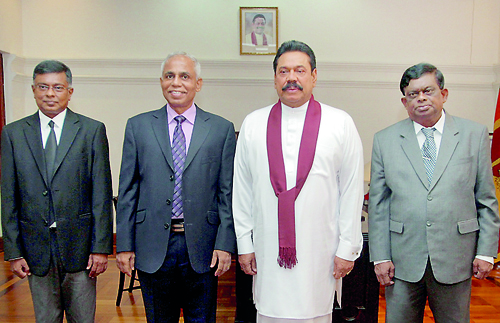News
Transparent criteria needed for promotion and appointment of Appellate Court Judges
President of the Bar Association of Sri Lanka Upul Jayasuriya addressing the ceremonial sitting for three new judges appointed to the Supreme Court this week said there should be a set of transparent criteria and a due process for the appointment and promotion of Appellate Judges which is not vested solely in the hands of one appointing authority.
“If merit, seniority and eminence are to be ignored with judicial appointments being made on the basis of collateral agenda our hope for the miracle of Asia would be a distant dawn,” Mr.Jayasuirya said.
The ceremonial sittings were for Justice Sisira De Abrew, Justice Sarath De Abrew and Justice Priyantha Jayawardena who were elevated to the Supreme Court.

Justices Sisira De Abrew, Sarath De Abrew and Priyantha Jayawardena with President Rajapaksa
The BASL President added that due consideration should be given to career Judicial Officers who have worked hard to administer justice during their entire careers and in suitable instances appointments should be made from the Attorney General’s Department. “If these salutary rules are breached, the outcome and its impact on the rule of law would be devastating,” he added.
He warned that if there was no proper procedure for making judicial appointments, public confidence in the independence and impartiality of the judiciary would be irreparably impaired.
He quoted Sir Winston Churchill who had once observed,” The principle of complete independence of the judiciary from the executive is the foundation of many things in our island life. . . . The judge has not only to do justice between man and man. He also has to do justice between the citizens and the State. ”
Mr. Jayasuriya also spoke on the members of the legal fraternity to defend their right to practise their profession with dignity whilst ensuring the safety of the Judiciary on the basis of the highest principles on which the legal profession is founded.
He said that by repealing the 17th Amendment to the Constitution and introducing the 18th Amendment, the Executive usurped the powers of the Constitutional Council to make these appointments once again, frustrating the long established traditions of the legal profession, judicial system and the hopes of a nation.
“The Constitutional provisions in India viz-a-viz the appointment of Judges to the Apex Court is the same. However the Supreme Court of India has by Judicial Interpretation propounded that the Executive Prerogative is not unfettered. Such appointments are made only on the recommendations of the Supreme Court,” he added.
“The appointing process of the Judges was challenged in Sri Lanka in the case of Edward Silva Vs. Shiranee Bandaranayake where it was held that the “best practice of appointment to the Apex Court is in a consultation with the Chief Justice, the Attorney General and the Minister of Justice,” he said.
Mr. Jayasuriya also said that the blame cannot be attributed only to the Executive. “The persons who do not fall within the time tested and respected criteria, cringe and scrounge brazenly at the feet of the Executive seeking such appointment whose lame excuse thereafter is that the Executive invitation cannot be turned down; are equally guilty of transgression against society. We the Legal Profession and the Civil Society and those of us entrusted with that public trust, are also to blame for it,” he said.
“If the Executive exercises a prerogative that it never possessed, the legal profession and the Judiciary would both have to plead mea culpa! Mea Maxima Culpa!”
Attorney General Palitha Fernando who made the welcome address at the ceremonial sitting said that the country’s legal system should move with the times to cater to the modern requirements and aspirations of the people or else it would lose public confidence.
“We cannot remain stagnant spectators in a fast changing world any longer,” he had said.
He added that inordinate delays in the law enforcement process had led to public confidence in the system being eroded and could have a corrosive effect on the rule of law itself.

